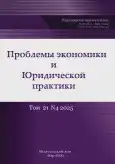Implications of the transition to the progressive scale of persons income
- Authors: Smirnova E.E.1, Sergeeva I.A.1
-
Affiliations:
- Financial University under the Government of the Russian Federation
- Issue: Vol 21, No 4 (2025)
- Pages: 194-199
- Section: Finance
- URL: https://journal-vniispk.ru/2541-8025/article/view/316469
- DOI: https://doi.org/10.33693/2541-8025-2025-21-4-194-199
- EDN: https://elibrary.ru/LIGAIN
- ID: 316469
Cite item
Abstract
The article examines the impact of the transition to a progressive personal income tax (PIT) scale in Russia starting from 2025. The theoretical context and international experience in applying progressive taxation to personal income are presented. Based on the Laffer curve model, the fiscal potential of the current tax rates (13%–22%) is assessed, and it is shown that the system is currently positioned on the upward-sloping segment of the curve. The advantages and limitations of the current tax scale are identified, along with its socio-economic significance and possible behavioral effects. The article also proposes measures to ensure fiscal sustainability and social equity in the further development of progressive taxation. Research writing purposes: studying the consequences of the transition to a progressive PIT scale in Russia from 2025 and evaluating its fiscal efficiency and behavioral impact. The conclusions received during the research: it was found that the current PIT rate structure in Russia (13%–22%) lies on the ascending portion of the Laffer curve, indicating that there remains fiscal room to increase revenues without risking a reduction in the tax base. The progression supports social fairness and brings the Russian system closer to international standards. However, any further adjustments to the tax rates should carefully consider behavioral responses and promote transparency and voluntary compliance mechanisms.
Full Text
##article.viewOnOriginalSite##About the authors
Elena E. Smirnova
Financial University under the Government of the Russian Federation
Author for correspondence.
Email: elenasmirnova@mail.ru
SPIN-code: 6926-9540
Cand. Sci. (Econ.), Associate Professor, Associate Professor of the Taxes and tax administration Department
Russian Federation, MoscowIrina A. Sergeeva
Financial University under the Government of the Russian Federation
Email: ira.serge2014@yandex.ru
SPIN-code: 8018-5647
Faculty of Economics and Business
Russian Federation, MoscowReferences
- Agapova A.A. Improving personal income taxation in the Russian Federation. Auditing Gazette. 2025. No. 1. Pp. 178–185. doi: 10.24412/1727-8058-2025-1-178-185.
- Aguzarova F.S., Tsirikhova A.R. The Tax system of the Russian Federation: Concept, principles, and structure. Economics and Management: Problems, Solutions. 2021. Vol. 2, No. 9 (117). Pp. 43–46. doi: 10.36871/ek.up.p.r.2021.09.02.005.
- Dagaev G.V., Pomulev A.A. The relationship between the laffer effect and the shadow economy. Shadow Economy. 2020. Vol. 4, No. 4. Pp. 225–234. doi: 10.18334/tek.4.4.111467.
- Kononenko O.V. Taxation in the digital economy: Challenges and prospects. Bulletin of the Institute for Economic Research. 2020. No. 1 (17). Pp. 147–153.
- Krivova N.M. Improving the PIT mechanism / N. M. Krivova // Youth. Science. Future—2025: Proceedings of the 2nd International Scientific and Practical Conference, Petrozavodsk, February 17, 2025. Petrozavodsk: International Center for Scientific Partnership «New Science» (Individual Entrepreneur Ivanovskaya I.I.), 2025. Pp. 65–69. EDN: FVEFQY.
- Smirnova E.E. Information infrastructure of tax administration: problems and development directions. Problems of Economics and Legal Practice. 2023. Vol. 19. No. 5. Pp. 308–314. doi: 10.33693/2541-80252023-19-5-308-314.
- Smirnova E.E. Assessment of tax risks arising for tax agents in relation to PIT. Finance: Theory and Practice. 2024. Vol. 28. No. 1. Pp. 64–74. doi: 10.26794/2587-5671-2024-28-1-64-74.
- Tikhonova A.V. Tax Burden and other motives for law-abiding behavior of individuals. Economics. Taxes. Law. 2021. Vol. 14. No. 2. Pp. 169–178. doi: 10.26794/1999-849X-2021-14-2-169-178.
- Chekalina E.V. Economic aspects of the 2025 tax reform. Economics and Entrepreneurship. 2025. No. 3 (176). Pp. 448–450. doi: 10.34925/EIP.2025.176.3.078.
- Chukhrai A.A., Chernova Yu.V. Personal income tax in 2025: Key changes. Kaluga Economic Bulletin. 2025. No. 1. Pp. 9–12. EDN: GLQYCV.
Supplementary files










